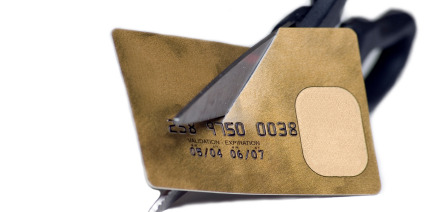To determine how serious your debt is you need to determine how much of your monthly net income (income after taxes, actual take-home pay) is going toward paying your debt. Don’t include expenditures here that go towards housing (e.g. mortgage) or investments.
As a general guideline, if your debt obligations are:
- 15% or less of your net monthly income you are in reasonable shape.
- between 15 and 20% your net monthly income could be a problem, particularly if your financial situation changes for the worse (e.g. you incur more debt, your income decreases). If you are managing to pay these debts while also saving or investing, you may be in a more reasonable position.
- over 20% of your net monthly income and you may be headed for serious trouble. If this debt is in the form of high interest credit cards or financing charges (e.g. paying for a furniture purchase), you should be working towards reducing your debt obligations, cutting back on expenses, etc.
Note:Your particular situation may vary (e.g. housing costs vary widely across the country) and some financial planners are reluctant to put percentages on a debt ratio, but many people find that percentages are a good reference point. If your situation differs greatly from these percentages, be certain that there is good reason for this.
Change your debt ratio
Should you be concerned about your debt ratio? Compare your debt ratio to the guidelines outlined previously.
- Does your debt ratio exceed 20 percent?
- Do you charge more and more and pay with cash less and less?
- Do you have trouble making payments on time?
- Do you live payday to payday with little or no savings?
- Do you use credit to pay for items that you used to pay for cash?
- Is your net worth negative?
- Do you let some bills slide and postpone payment for a month?
- Do you make partial payments instead of paying the entire bill?
- Do you take out new credit cards to cover additional purchases after you max out the cards you’re currently using?
- Do you regularly use your overdraft on your chequing account?
- Do you put bills off until the second (or later) notice?
- Do you bounce cheques or pre-authorized payments?
Cut credit costs
Credit card use that gets out of control costs you money and delays your ability to invest in your financial future. Try the following to reduce credit costs:
- Shop for a low-cost or no-fee card. Don’t pay fees for cards that offer benefits unless you really need the extra benefit they offer.
- Use credit for necessary purchases that you cannot immediately afford but can pay for before interest charges start.
- If you must make a major (large) purchase on a credit card, use a card that has a low interest rate.
- Review your credit card statements carefully each month for mistakes.
- Reduce the amount of credit available to you. Cancel cards you don’t need.
- Pay off outstanding balances before taking on more debt. Re-evaluate the amount of debt you’re willing to carry in relation to the amount of money you want to save.
- Pay off cards with highest interest rate first.
- Consolidate your debts so you pay interest charges on only one card.
Learn More
For more information about financial well-being, the following resources may be helpful.
- MoneySense Magazine (Canadian resource). www.moneysense.ca
- Invest in your financial well-being. Government of Canada. https://www.canada.ca/en/financial-consumer-agency/news/canadas-financial-literacy-blog/invest-financial-well-being.html
- Canada’s Financial Literacy Blog. Government of Canada. https://www.canada.ca/en/financial-consumer-agency/news/canadas-financial-literacy-blog.html
- Canadian Financial Calendars. My Money Coach (From Credit Counselling Society). https://www.mymoneycoach.ca/resources/financial-calculators
- Credit Counselling Society. https://www.nomoredebts.org/
- Mortgage Affordability Calculator. Canada Mortgage and Housing Corporation (CMHC). https://www.cmhc-schl.gc.ca/en/finance-and-investing/mortgage-loan-insurance/homebuying-calculators/affordability-calculator













